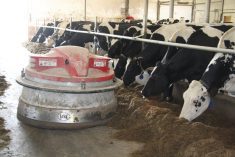WILLIAMS LAKE, B.C. – Last summer, David Haywood-Farmer was checking his cattle near Kamloops, B.C., when he found two sets of wolf tracks by a calf’s remains.Such incidents are happening more often on British Columbia ranges and beef producers want something done.The B.C. Cattlemen’s Association has been meeting with provincial ministers because the Wild Predator Loss Control and Compensation Program is ending. The seven-year pilot project worked at controlling wolves, cougars and grizzly and black bears and provided compensation for loss of livestock. Those attending the BCCA annual meeting in Williams Lake, B.C., May 28-29 said money was not the issue. It’s a matter of control because wolves are showing up in new places.Duncan Barnett of the Cariboo Cattlemen’s Regional Association said government needs a better control and compensation program.”This is just a bloody mess,” he said “We seem to get caught up in a buck passing business with no funding being available. I just think we are not getting the job done,” he said.The association met with the ministers of environment and agriculture on May 18 to outline the problems and requested a solution from the ministers, said Kevin Boon, BCCA manager.They will meet again in mid June with a new committee of cattle producers and government to develop another program that calls for producers to provide 25 percent of the compensation money.The BCCA board decided to cover that percentage because ranchers do not have the extra cash. The association also wants producers to report kills and problems to the office so they can provide evidence to government.The ranchers do not want a bounty on wolves because it may not remove the problem animals.”We have a very keen focus on the environment and the proper balance in nature,” said Boon.Some wolves prey on calves in the spring but can be worse in late summer when they are training their young to hunt. There are packs that never bother livestock but instead prey on elk, deer and other wildlife.The control program in the past has been to eliminate the ones that have focused on cattle and have gone from natural prey to easy prey, Boon said. “If you get the right wolves out of the system, the other ones will keep them out of the country. It is basically keeping a balance to nature,” he said.
Read Also

Manitoba extends Crown land rent freeze
Manitoba government links the continued rental rate freeze on grazing and forage leases to economic and environmental challenges facing the industry















